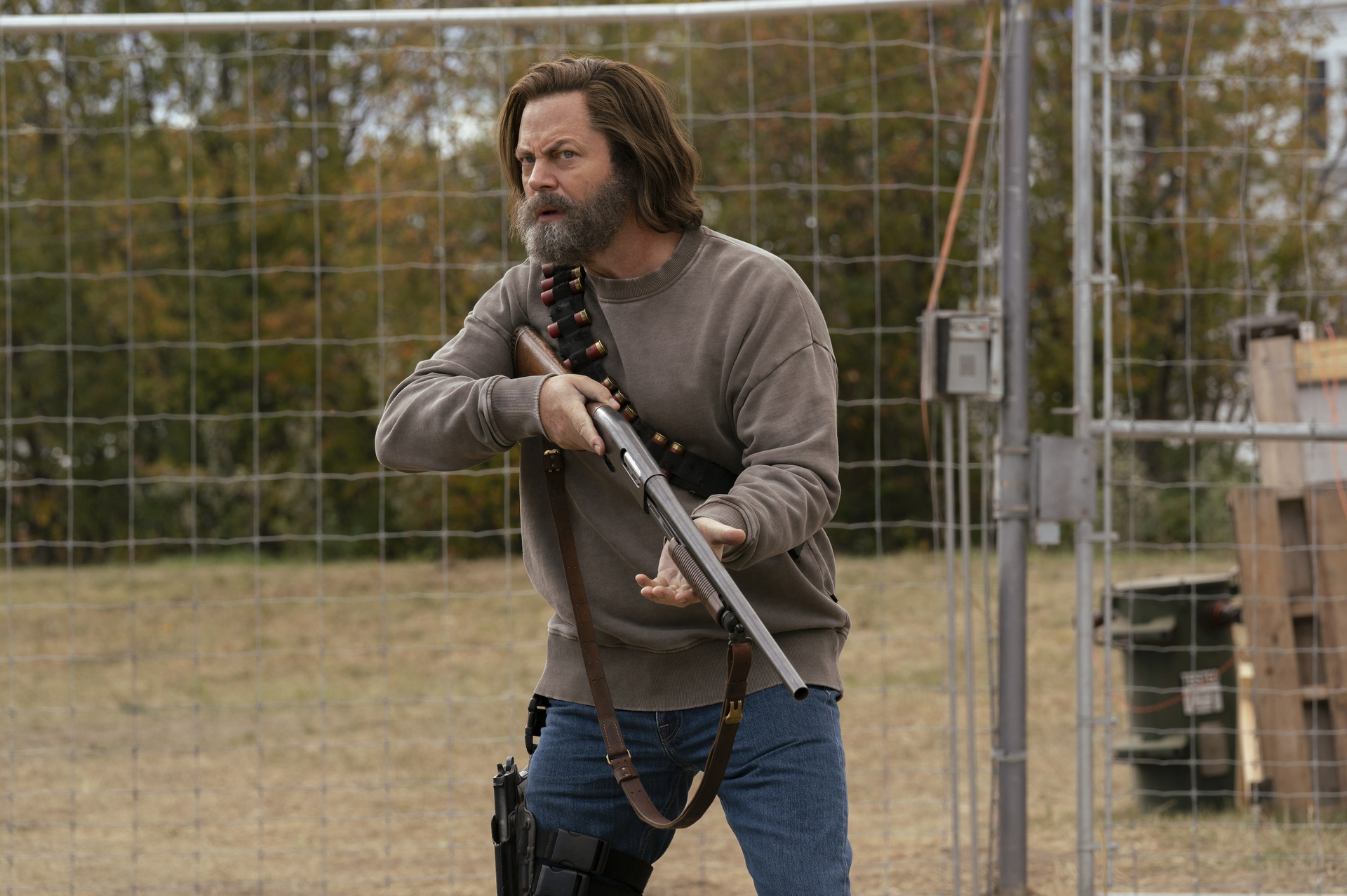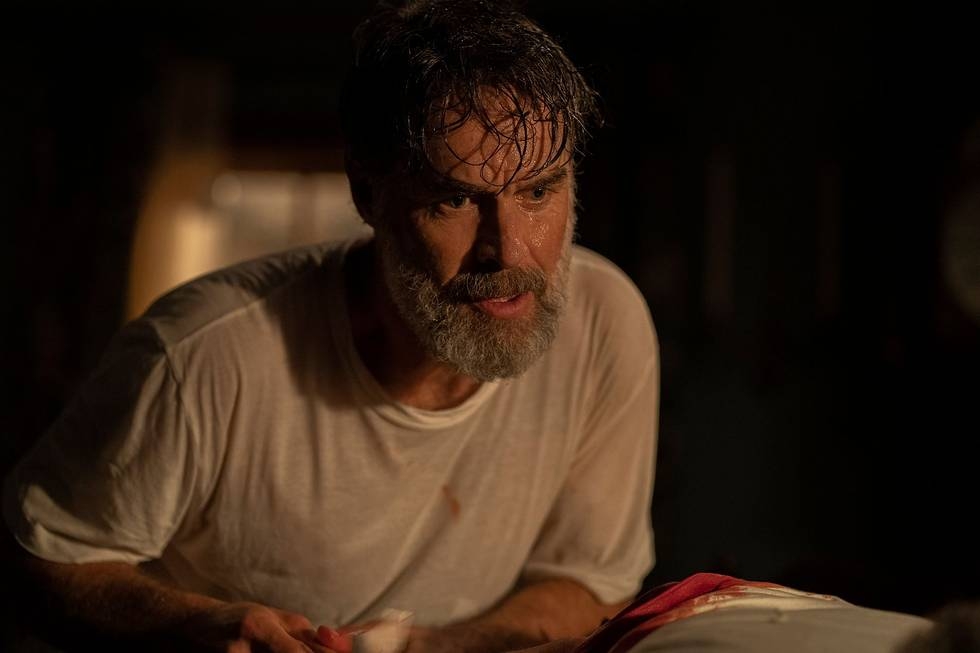Warning: This post contains spoilers for episode 3 of The Last of Us and for the video game
The third episode of The Last Of Us switches up the show’s perspective and tone. We leave our two protagonists, Ellie and Joel, and spend time instead with a survivalist named Bill, played by Nick Offerman. When the infection is first discovered in 2003, Bill hides out in his home in the suburbs of Boston while everyone else evacuates the town. He then creates his own Eden, which he protects by setting traps throughout his abandoned town to take down zombies and scavengers.
He spends years alone until a man named Frank (Murray Bartlett) stumbles into one of his traps. Bill cautiously rescues Frank and the two slowly bond over wine, music, and the company of another human being. Eventually, they fall in love and develop a tender relationship. Frank befriends Joel’s partner Tess via radio communication, and soon Bill and Frank are on double dates with Joel and Tess, to the chagrin of Joel and Bill, both of whom would prefer to keep their inner circles small. Two decades later, when Frank gets sick, he decides to end his life. On his last day, the two men get married, and Bill informs Frank that he intends to die too. By the time Ellie and Joel make their way to Bill’s guarded town, both men have already passed in their sleep.
It’s an Emmy-worthy moment from the hit HBO series—but also the biggest diversion from the source material so far. In the video game upon which the show is based, Joel and Ellie encounter a still-alive Bill who believes he’s been abandoned by Frank. Their romantic relationship is only alluded to through clues in the game but never shown or spoken outright.
Read more: HBO’s The Last of Us Adaptation Is Astonishingly Well Made—But Something’s Missing

Showrunners Craig Mazin and Neil Druckmann, the latter of whom also created the game, saw Bill and Frank’s story as a moment to switch up the tone of the show and give two minor characters in the game a much more fleshed-out (and happier) backstory.
“I thought we had an opportunity there to give the audience a bit of a break,” Mazin says. “Episode 1 and Episode 2, there’s a lot of holding your breath. There’s a lot of tension, a lot of sadness and tragedy and violence. And now maybe there’s a chance to take a little bit of a breath.”
Chronicling Bill’s story from the beginning of the pandemic, rather than introducing him 20 years in, also allowed the show to expand its scope. Whereas the game sticks closely to Joel and Ellie’s perspectives, the show is more interested in the global impact of the zombie apocalypse. We’ve already seen an interview with a scientist predicting that a fungal infection will end the world and spent time with a professor of mycology in Jakarta who discovers the outbreak early and warns the government that they need to drop a bomb on the city to contain it.
Read more: How HBO’s The Last of Us Tries to Capture the Video Game’s Complex Morality
Bill’s story gives a brief glimpse into the initial evacuations conducted by FEDRA (a stand-in for FEMA) and throughout the U.S. to get a sense of how cities like Boston became safe zones while much of the American landscape was abandoned to the infected. It also shows how even uninfected people were sacrificed during a triage approach to fighting the infection. “With Bill, we were able to explore the passage of time,” says Mazin. “One of the things we didn’t really see in the game was, OK, what was it like five days afterwards? Three years afterwards? Five years afterwards?”
The brief allusions to Bill and Frank’s love story in the game are much more grim than the version we get in the TV series. In the game, Joel cashes in on a favor Bill owes him by asking Bill to help him rig up a working car. Bill begrudgingly sets to work looking for parts throughout his abandoned town. Eventually, Bill, Joel, and Ellie discover Frank’s body. It turns out that Frank became infected and hanged himself before he could turn into a monster. Frank leaves a suicide note for Bill in which he excoriates the survivalist and expresses hatred towards him, suggesting their romantic relationship ended badly.
Throughout the encounter, Bill bickers with Joel and Ellie. He warns Joel that caring for someone will only get him killed. “Bill and Joel are a lot alike,” says Mazin. “It’s why they don’t like each other when they meet. They’re both protectors who are interested in keeping other people alive through violence if they must. And they’re also people who through wounds—very different kinds of wounds—have shut the rest of the world out.”

He continues, “We’ve externalized this completely with Bill. He’s completely shut the world out with an electrified fence and traps. But then, no matter what you do, no matter how many walls you build around your heart, someone is going to sneak through, then the question is what happens when that person sneaks through, what lessons do you learn from them, and how do they make your life better?”
In the show, Mazin and Druckmann revise the love story, allowing Bill and Frank not only to fall deeply in love with one another but to find decades of happiness together. “I wanted to show there’s this other form of love that’s the product of time and commitment,” says Mazin. “I’ve been married for 27 years, and I may not be a gay man, but I am a middle-aged man in a long relationship. And I know that there’s a certain different kind of love that happens that you can’t get early on. It doesn’t flood you with endorphins and dopamine. It’s different. And it’s just as important because two people’s lives intertwine in a way that is inextricable, and I think beautiful.”
Eventually after Frank becomes ill, they choose to die together because Bill does not want to live without the love of his life. Mazin argues that Frank and Bill’s melancholy but beautiful ending serves an important purpose for the story going forward.
“One of my goals was to show that there was a way to win. I mean, it ends sadly, but it’s a happy ending as far as I’m concerned. They had a great life together,” says Mazin. “And if we know emotional success can still happen in this world, if it can go well, we can worry a little bit more as Joel and Ellie move through this story because if there’s no chance it goes well, then no one cares much. But if there is, that’s what the story is about.”
If you or someone you know may be contemplating suicide, call the National Suicide Prevention Lifeline at 1-800-273-8255 or text HOME to 741741 to reach the Crisis Text Line. In emergencies, call 911, or seek care from a local hospital or mental health provider.
More Must-Reads from TIME
- Donald Trump Is TIME's 2024 Person of the Year
- Why We Chose Trump as Person of the Year
- Is Intermittent Fasting Good or Bad for You?
- The 100 Must-Read Books of 2024
- The 20 Best Christmas TV Episodes
- Column: If Optimism Feels Ridiculous Now, Try Hope
- The Future of Climate Action Is Trade Policy
- Merle Bombardieri Is Helping People Make the Baby Decision
Write to Eliana Dockterman at eliana.dockterman@time.com